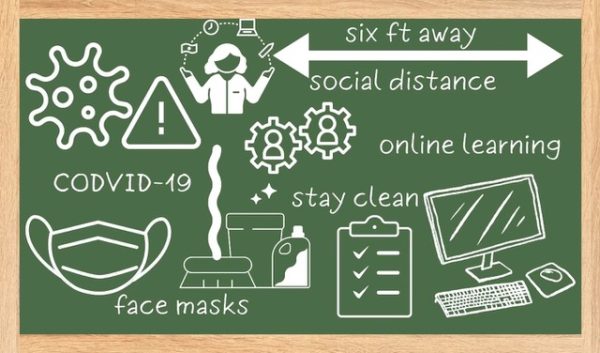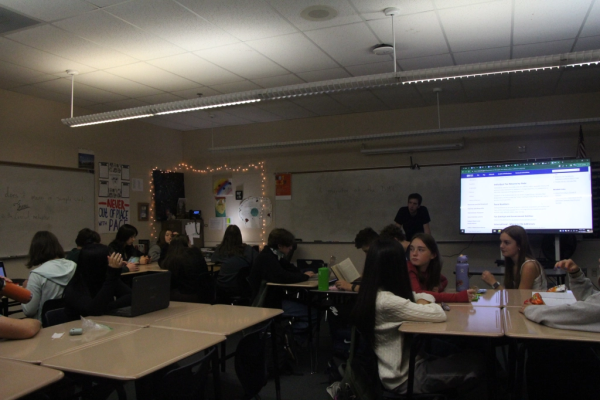I didn’t walk out
On Monday, Feb. 4, students walked out during third period in a show of support of the district’s new health curriculum. I was not among them. Not because I do not believe in a comprehensive or inclusive health curriculum. I support marriage equality, and it should go without saying that I believe in consent. However, I was and still am unsure as to what exactly the students were protesting, as our school teaches consent on half days and LGBTQ topics are covered during the current wellness classes. Our school does a good job of fostering inclusion, as is evidenced by the many clubs focused on promoting an inclusive environment. Additionally, much of the language arts curriculum is designed to increase awareness and acceptance of multiple orientations and experiences.
So, for me it is difficult to pin down exactly what the students’ concern was. The only thing I can figure, is that many objected to parental feedback regarding the new curriculum. Walkout organizers said that parents were the only ones objecting to this new curriculum and protesters sported signs, many conveying the message of “My health,” alluding to the belief that parents should not have a say in what their children are being taught in school. I talked to many concerned adults and not one objected to a curriculum that included teaching contraception, consent or different sexual orientations. The problem the parents had was in the possible implementation of FLASH, an untested curriculum not based in science and that many feel promotes a political agenda.
“The curriculum is obviously pushing an agenda. The teachings are fairly new and centered around the West Coast. The majority of the country hasn’t adopted this curriculum, suggesting that these teachings could still be potentially detrimental to students development as they are still untested,” said a parent who wished to remain anonymous.
Proponents of the walkout said that the event was not politically motivated and that it was simply about health curriculum. This is debatable. Parents were particularly concerned about the manner in which the curriculum addressed the complicated issue of gender identity. The FLASH curriculum that was being considered for implementation required middle school students to discuss a scenario in which a gay male adolescent began to start to question whether he is not truly gay and instead transgender. One major issue with this lesson is that it is unreasonable to assume a middle school student can determine what a kid with gender dysphoria should do when doctors debate the best plan of action. People are concerned because children with gender dysphoria are being treated with medical interventions that can lead to long-term ramifications as serious as sterilization.
Parents were also concerned that the FLASH curriculum normalizes gender dysphoria. For example, the text uses gender-neutral terminology that seems to intentionally lack scientific specificity (i.e. “people with ovaries” have periods, not “women”). Parents objected not because they wanted to ostracize transgender people, but because promoting something with untested repercussions is extremely irresponsible. Lisa Littman, an assistant professor in behavioral sciences at Brown University, published a study on a significant increase in gender dysphoria. The study yielded statistics that suggest that some cases of gender dysphoria may be transmitted among peer groups. Please note, that neither she nor I are saying that gender dysphoria is not real and in many cases biological, only that it could have multiple causes (genetic in some cases, environmental in others). If there is any chance of students being influenced by their peers decisions to alter their bodies anatomy and physiology, the school should be careful about selecting a curriculum that has a heavy focus on these issues.
This is problematic because current protocol is to not question anyone who wants to transition genders. The assumption is that gender dysphoria is always innate, and never attributed to outside factors. Littman and others are concerned because the effects of the decision include life-altering medicine and surgeries. When people ask students struggling with gender dysphoria questions, it does not make them bigoted. The questions may be intended to help struggling individuals not react on impulse. It seems that the FLASH curriculum pushes a political agenda, rather than focusing on established scientific facts. This is problematic not because students shouldn’t have to listen to opinions that are not their own, but because a wellness class is not the place to do so. Wellness I and II are compulsory classes required for graduation. One objective stated during the curriculum discussions was an attempt to shift the focus of the class from scientific facts towards “student knowledge.” This seems to indicate that the curriculum is indeed pushing an agenda, as it is not based on science, but instead on ideology.
I did not refrain from walking out in an attempt to silence or disrespect those who feel their voices are not heard and need representation. And the truth is I believe that every person has the right to live as they choose, without fear of social reprisal. I chose not to walk out because I truly think it is harmful to discount parents and promote an agenda based on untested ideas in an attempt to be inclusive.
Your donation will support the student journalists of West Linn High School. Your contribution will allow us to continue to produce quality content by purchasing equipment, software, and continuing to host our website on School Newspapers Online (SNO).

At the age of six, Gavin Turner, sophomore, was telling tales of woolly mammoths and saber tooth tigers to his grandmother. It was just the beginning...

Amateur magician and wannabe improv comedian Philip Chan has been writing for The Amplifier since his freshman year. Now co-editor in chief, Chan firmly...


























![Game, set, and match. Corbin Atchley, sophomore, high fives Sanam Sidhu, freshman, after a rally with other club members. “I just joined [the club],” Sidhu said. “[I heard about it] on Instagram, they always post about it, I’ve been wanting to come. My parents used to play [net sports] too and they taught us, and then I learned from my brother.”](https://wlhsnow.com/wp-content/uploads/2024/03/MG_7715-2-1200x800.jpg)





![The teams prepare to start another play with just a few minutes left in the first half. The Lions were in the lead at halftime with a score of 27-0. At half time, the team went back to the locker rooms. “[We ate] orange slices,” Malos said. “[Then] our team came out and got the win.”](https://wlhsnow.com/wp-content/uploads/2023/10/IMG_2385-1200x800.jpg)





![At the bottom of the third inning, the Lions are still scoreless. Rowe stands at home plate, preparing to bat, while Vandenbrink stands off to the side as the next batter up. Despite having the bases loaded, the team was unable to score any runs. “It’s just the beginning of the season. We’re just going to be playing out best by June, [and] that’s where champions are,” Rowe said.](https://wlhsnow.com/wp-content/uploads/2024/03/IMG_3077-1200x900.jpg)

















































































